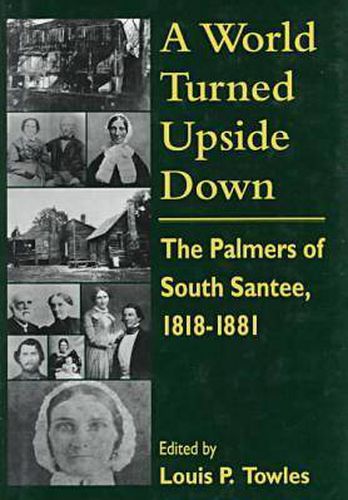Readings Newsletter
Become a Readings Member to make your shopping experience even easier.
Sign in or sign up for free!
You’re not far away from qualifying for FREE standard shipping within Australia
You’ve qualified for FREE standard shipping within Australia
The cart is loading…






A remarkable chronicle of one family’s thirty-year plummet from prominence to poverty
A World Turned Upside Down follows the trials of the nineteenth-century planter family that once dominated the southern banks of South Carolina’s Santee River. Voluminous, literate, and rich in detail, the Palmer letters and journal entries serve as a sustained narrative of the economic pressures and wartime tragedies that shattered the South’s planter aristocracy.
The volume offers insight into every aspect of plantation life: education, religion, household management, planting, slave-master relations, and social life. While the antebellum writings reveal rigid attitudes about social, economic, political, and religious concerns, the wartime correspondence depicts the devastation of those attitudes and of the Palmers’ lifestyle. In addition to overwhelming material concerns, the Palmers describe the emotional impact of wartime casualties and of God’s seeming indifference to their plight.
By the close of the war, the Palmers were heavily in debt. Their letters from that period tell of unprofitable contract labor and sharecropping, the desertion and loss of slaves, the search for nonagricultural employment, and their changing social status.
$9.00 standard shipping within Australia
FREE standard shipping within Australia for orders over $100.00
Express & International shipping calculated at checkout
A remarkable chronicle of one family’s thirty-year plummet from prominence to poverty
A World Turned Upside Down follows the trials of the nineteenth-century planter family that once dominated the southern banks of South Carolina’s Santee River. Voluminous, literate, and rich in detail, the Palmer letters and journal entries serve as a sustained narrative of the economic pressures and wartime tragedies that shattered the South’s planter aristocracy.
The volume offers insight into every aspect of plantation life: education, religion, household management, planting, slave-master relations, and social life. While the antebellum writings reveal rigid attitudes about social, economic, political, and religious concerns, the wartime correspondence depicts the devastation of those attitudes and of the Palmers’ lifestyle. In addition to overwhelming material concerns, the Palmers describe the emotional impact of wartime casualties and of God’s seeming indifference to their plight.
By the close of the war, the Palmers were heavily in debt. Their letters from that period tell of unprofitable contract labor and sharecropping, the desertion and loss of slaves, the search for nonagricultural employment, and their changing social status.